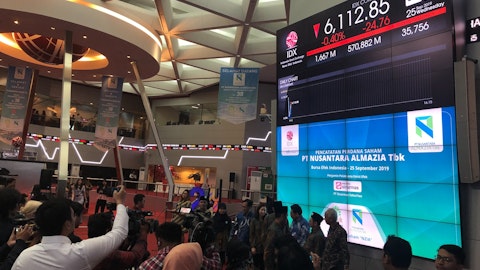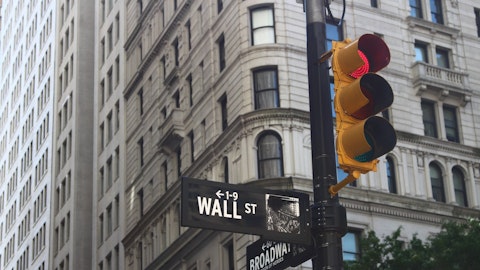So on the commercial and wealth and asset management side, the betas have been running, 65% to 70%. And those betas will flatten out as the Fed stops hiking. So part of what’s assumed in the slide is that the Fed gets to 525 and stops and so that would have a flattening effect. And the reality here is that there’s a lot of uncertainty as to how competition is going to behave over the next several quarters. And you can see on the slide thus far, we’ve done well versus the industry from a deposit beta standpoint, but we definitely want to defend our book as well as continue to have strong new customer acquisition.Manan Gosalia Got it. Thank you.Operator Our next question comes from a line of Ebrahim Poonawala from Bank of America. Please proceed.Ebrahim Poonawala Good morning.Timothy Spence Morning, Ebrahim.Ebrahim Poonawala Just two quick follow ups, one on credit.
I think, Jamie, you mentioned about 80% base case, unemployment 4%. Give us a sense of just sensitivity if that 4% were to be 5%, what does that mean for your allowance or the consumer allowance?James Leonard Yes, the ACL would go up 250 million for every 1% assuming all other assumptions stay, as is.Ebrahim Poonawala Okay, helpful. And other quick follow up on going back to Tim, your comments around capital. And Matt, given just the uncertainty around regulations, Mac, macro economy, the nine and a quarter CT1 like, do you? Should we anticipate that drifts higher at least for the next few quarters until there’s more visibility? Or do you expect to be more proactive and return back to sort of buybacks in the back half of the year?Timothy Spence Yes, I think just given the guidance that we provided, if you assume no buybacks in the second quarter, which is right, it would imply we get to nine five by June 30.
Ebrahim, I, Jamie and I both feel confident we could run the business at nine and a quarter, it just feels prudent at this point in time to make sure that the environment does fully settle out before we resume repurchases.Ebrahim Poonawala And just on the environment. I think last quarter, we talked about things worsening maybe back half of this year into 24. Do you have any better visibility in terms of just the shape of the credit cycle, how deep it could be? And just when we begin to actually see the first sort of deterioration, show up in the numbers on credit metrics.Timothy Spence We continue to think the back half of this year it is the beginning of next is probably the right period. I think we have been operating under the belief that some of the rosier data that came out in the winter was a little bit of a head fake because you had unseasonably good weather and the by-product of that was you had spending in a variety of under other indicators, Flash more positive than I think people had anticipated.
And in part, that’s why you saw the Fed, ramp up rhetoric. Again, the IFM indices are, from my point of view, the best thing to watch here, they certainly are in our footprint, and they all are signaling a slowdown. And the Fed is not going to be able to relent and get inflation under control just based on what we hear from clients without sticking at, a five plus level for some extended period of time. And when that happens, that’s very restrictive, right things are going to break.My own view is that this is light, we’re likely to return to a period where there’s more regional divergence than you’ve seen. And the most recent two cycles. I’m I am very happy to be Midwest and southeast Bank is a moment like the data that’s come out of the Census Bureau on spending on factories, right, we had 108 billion in spending on factories last year, which was an all-time record that Financial Times did nice work on commitments that have been made, there’s more than 200 billion in capital commitments.





